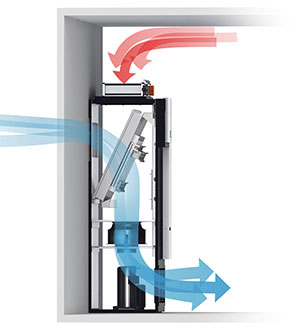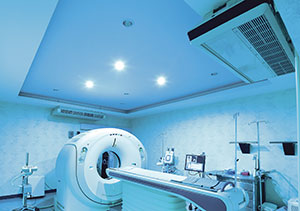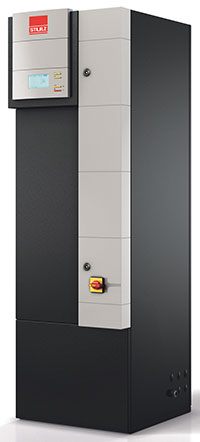Poorly specified cooling technology can result in erratic climate control, increased operating expenditure, and costly disruption to IT operation.  With emerging trends including 5G, IoT, automated vehicles and digitisation in the industrial sector, there will be a dramatic increase in remote edge data centres and small, localised server rooms – reliability will be crucial.
With emerging trends including 5G, IoT, automated vehicles and digitisation in the industrial sector, there will be a dramatic increase in remote edge data centres and small, localised server rooms – reliability will be crucial.
A lack of awareness of the differences between comfort cooling and precision cooling is impacting the reliability of IT infrastructure, resulting in serious consequences for businesses.
Around half of businesses currently install comfort cooling in small server rooms instead of the correct precision cooling. This is a common mistake; there is a need for education on the importance of precision cooling in delivering resilient IT operations.
Comfort cooling units are designed for cooling people in offices and retail environments. This type of cooling technology is intended to operate for short periods of time (of around five hours per day, five days per week) and its typical life expectancy is around five years. Precision cooling however, is designed for use in technical environments and the typical life span is 10-15 years.
 Comfort cooling units as part of their design are designed to cater for ‘latent heat.’ Environments that are populated by people (as opposed to technical equipment) produce this type of heat, which contains moisture, while technical spaces (such as server rooms) radiate pure heat – referred to in the industry as ‘sensible heat’.
Comfort cooling units as part of their design are designed to cater for ‘latent heat.’ Environments that are populated by people (as opposed to technical equipment) produce this type of heat, which contains moisture, while technical spaces (such as server rooms) radiate pure heat – referred to in the industry as ‘sensible heat’.
A comfort cooling unit will have a typical ‘sensible heating ratio’ of 0.5-0.6, while a precision unit will have a sensible heat of ratio of 1.
Comfort cooling units, which are designed to remove the moisture produced in retail and office spaces, can use up to 50% of their energy for dehumidification. This is an important difference – precision air conditioning units convert more than 95% of the energy used exclusively into cooling capacity. Therefore, the technology required to achieve this pays off quickly in terms of lower operating costs.
 A comfort cooling unit rated at 10kW, with a sensible heat ratio of 0.5, will only deliver 5kW of sensible cooling. A precision cooling unit, with a heat ratio of 1, on the other hand, will deliver the full 10kW. This means you may need to specify two comfort cooling units to deliver the same capacity as one precision cooling unit.
A comfort cooling unit rated at 10kW, with a sensible heat ratio of 0.5, will only deliver 5kW of sensible cooling. A precision cooling unit, with a heat ratio of 1, on the other hand, will deliver the full 10kW. This means you may need to specify two comfort cooling units to deliver the same capacity as one precision cooling unit.
Unlike comfort air conditioning units, precision units feature strictly controlled and accurate dehumidification (tolerance ±5% relative humidity), as too much humidity can lead to condensation and corrosion, while too little can cause static charges, data loss and damage to hardware.
Precision cooling units with EC fan technology can also offer further savings in running costs.
It is a ‘false economy’ to prioritise capital outlay when specifying air-conditioning units: if you install a solution that isn’t appropriate for the technical environment, you will have issues. Effectiveness must be the primary consideration, along with long-term operating costs.
Furthermore, comfort cooling systems also perform ‘oil return cycles’, which override the set temperature controls and can lead to intermittent falls in temperature.
While this is less of a problem in server rooms, this can present issues in environments such as laboratories, where precise temperatures are critical to the integrity of the testing process. Precision cooling units do not need this operating feature and therefore present no operational risk in this way.
Other important differences include that for comfort cooling applications, it is less important for the filter to be highly effective in removing small particles; dust circulation has no detrimental effect in a non-technical environment.
In server rooms and technical spaces, it is crucial to prevent particles being blown or sucked into technical equipment, as this can shorten the lifespan of IT assets.
Ultimately, rooms subject to high thermal loads need constant climatic conditions in order to work reliably.
Precision cooling technology is specifically designed for server rooms and technical environments where reliable thermal optimisation and high availability are crucial business imperatives.
